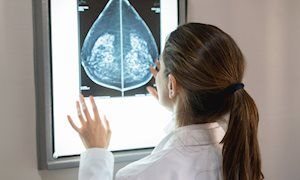7 March 2019
Artificial intelligence (AI) systems performing at radiologist-like levels in the evaluation of digital mammography (DM) would improve breast cancer screening accuracy and efficiency. We aimed to compare the stand-alone performance of an AI system to that of radiologists in detecting breast cancer in DM.
Methods
Nine multi-reader multi-case study datasets previously used for different research purposes in seven countries were collected. Each dataset consisted of DM exams acquired with systems from four different vendors, multiple radiologists’ assessments per exam, and ground truth verified by histopathological analysis or follow-up, yielding a total of 2,652 exams (653 malignant) and interpretations by 101 radiologists (28,296 independent interpretations). An AI system analyzed these exams yielding a level of suspicion of cancer present between 1 and 10. The detection performance between the radiologists and the AI system was compared using a non-inferiority null hypothesis at a margin of 0.05.
Results
The performance of the AI system was statistically non-inferior to that of the average of the 101 radiologists. The AI system had a 0.840 (95% CI = 0.820-0.860) [ARR1] area under the ROC curve (AUC) while the average of the radiologists was 0.814 (95% CI = 0.787-0.841) (difference 95% CI = (-0.003-0.055))[ISS2] . The AI system had an AUC higher than 61.4% of the radiologists.
Conclusions
The evaluated AI system achieved a cancer detection accuracy comparable to an average breast radiologist in this retrospective setting. While promising, the performance and impact of such a system in a screening setting needs further investigation.
Rodriguez-Ruiz A, Lång K, Gubern-Merida A, Broeders M, Gennaro G, Clauser P, Helbich TH, Chevalier M, Tan T, Mertelmeier T, Wallis MG, Andersson I, Zackrisson S, Mann RM, Sechopoulos I.
Ioannis Sechopoulos is member of theme Women's cancers.
 In an article appearing in the journal of the National Cancer Institute, Ioannis Sechopoulos and colleagues showed that current artificial intelligence systems can detect breast cancer in mammograms as well as a breast radiologists.
In an article appearing in the journal of the National Cancer Institute, Ioannis Sechopoulos and colleagues showed that current artificial intelligence systems can detect breast cancer in mammograms as well as a breast radiologists.
Abstract
BackgroundArtificial intelligence (AI) systems performing at radiologist-like levels in the evaluation of digital mammography (DM) would improve breast cancer screening accuracy and efficiency. We aimed to compare the stand-alone performance of an AI system to that of radiologists in detecting breast cancer in DM.
Methods
Nine multi-reader multi-case study datasets previously used for different research purposes in seven countries were collected. Each dataset consisted of DM exams acquired with systems from four different vendors, multiple radiologists’ assessments per exam, and ground truth verified by histopathological analysis or follow-up, yielding a total of 2,652 exams (653 malignant) and interpretations by 101 radiologists (28,296 independent interpretations). An AI system analyzed these exams yielding a level of suspicion of cancer present between 1 and 10. The detection performance between the radiologists and the AI system was compared using a non-inferiority null hypothesis at a margin of 0.05.
Results
The performance of the AI system was statistically non-inferior to that of the average of the 101 radiologists. The AI system had a 0.840 (95% CI = 0.820-0.860) [ARR1] area under the ROC curve (AUC) while the average of the radiologists was 0.814 (95% CI = 0.787-0.841) (difference 95% CI = (-0.003-0.055))[ISS2] . The AI system had an AUC higher than 61.4% of the radiologists.
Conclusions
The evaluated AI system achieved a cancer detection accuracy comparable to an average breast radiologist in this retrospective setting. While promising, the performance and impact of such a system in a screening setting needs further investigation.
Publication
Stand-Alone Artificial Intelligence for Breast Cancer Detection in Mammography: Comparison With 101 Radiologists.Rodriguez-Ruiz A, Lång K, Gubern-Merida A, Broeders M, Gennaro G, Clauser P, Helbich TH, Chevalier M, Tan T, Mertelmeier T, Wallis MG, Andersson I, Zackrisson S, Mann RM, Sechopoulos I.
Ioannis Sechopoulos is member of theme Women's cancers.
Related news items

Supplemental MRI screening for women with extremely dense breast tissue
9 January 2020 In the New England Journal of Medicine, the DENSE trial study group including RIHS researchers Ritse Mann and Nico Karssemeijer showed that additional MRI after the nationwide breast screening, reduces interval breast cancer in women with extremely dense breast tissue. read more
Awarded KWF grants for Radboudumc researchers
18 December 2019 KWF is investing 2.7 million euros in five different studies at Radboudumc. The awards are part of the new round of funding by DCS, in which over 34 million euros will be granted to Dutch cancer research. We congratulate our researchers with this funding and wish them success with their great work. read more
ERC Consolidator Grant for Bousema and Sechopoulos
12 December 2019 Teun Bousema and Ioannis Sechopoulos each receive an ERC Consolidator Grant of around two million euros. This European research subsidy will enable them to carry out research for the next five years. read more
Technology for Oncology II grant application funded
21 November 2019 The grant application called "aiREAD – Accurate and Intelligent Reading for EArlier breast cancer Detection” by project leader Ioannis Sechopoulos, has been selected for funding under the NWO TTW – KWF Kankerbestrijding – Top Sector LSH Partnership “Technology for Oncology II”. read more
VIDI grant for Ritse Mann
27 May 2019 Ritse Mann, theme Women's cancers, receives up to 800,000 euros to develop an innovative research theme and to build up his own research group. NWO is awarding the Vidi grant as part of the Innovational Research Incentives Scheme. read more
